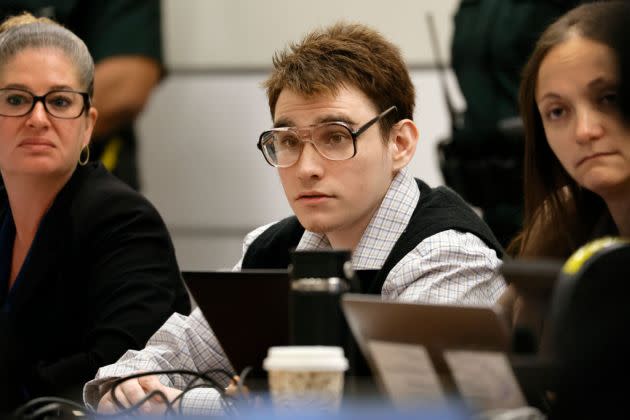Parkland Shooter Nikolas Cruz Officially Sentenced to Life in Prison

Nikolas Cruz was formally sentenced to life in prison without parole for killing 17 people in the mass shooting at Marjory Stoneman Douglas High School in Parkland, Florida, according to The Associated Press.
The sentence was handed down Nov. 2, several weeks after the jury recommended he receive life in prison instead of the death penalty. Prior to the official sentencing, witnesses and family members of the victims were given the chance to address Cruz and the court, with many expressing anger that Cruz had been spared execution.
More from Rolling Stone
'I Wish No Peace For You': Parkland Victims' Families Address Shooter
Jurors Detail 'Tense' Deliberations Over Parkland Shooter's Fate: 'It Got Ugly'
Parkland School Shooter Trial: He Chose Valentine's Day Because He Had 'No One to Love'
Nearly a year after Cruz pleaded guilty to all 17 counts of murder and attempted murder, the jury in the penalty phase of his trial handed down a sentence of life in prison for all counts. Cruz faced the death penalty or life in prison for the Valentine’s Day 2018 school shooting.
In reviewing each count, the jury agreed that Cruz was guilty of the shooting. However, at least one member of the jury believed that “mitigating factors” — in this case, Cruz’s mental illness — outweighed the evidence to justify the death penalty. (In 2016, the guideline for a jury to recommend the death penalty in Florida was changed from a majority vote to a unanimous vote.)
The verdict was announced after two days of jury deliberation. The decision ended the three-month trial, which included graphic photos and videos from the massacre, heart-wrenching testimony from both survivors and family members of the victims, and a tour of the blood-stained Florida school where the shooting took place.
In July, survivors of the Parkland shooting delivered emotional testimony in support of the state’s death penalty case; the following month, jurors — as well as prosecutors, Cruz’s lawyers, and the judge — were transported from the courthouse to the still-closed Marjory Stoneman Douglas building in the school complex where the shooting happened. Cruz himself waived his right to return to the crime scene. (The Broward County school district previously said it would seek to demolish the building following the death penalty case.)
Cruz’s lawyers abruptly rested their case in the death penalty trial on Sept. 14, prompting an uproar in the courtroom and an admonishment from the judge; for their defense, Cruz’s lawyers reportedly planned to call 80 witnesses over 11 days. They ended up only calling 25 before resting.
Circuit Judge Elizabeth Scherer and Cruz’s lead attorney Melisa McNeill got into a shouting match (the jury had not yet entered the courtroom when the squabble occurred), with Scherer reportedly saying McNeill’s decision to close the case without warning her or the prosecution was “the most uncalled for, unprofessional way to try a case.”
During the prosecution phase, a video of a psychiatrist’s March 2022 jailhouse evaluation of Cruz was shown to the jury, revealing that Cruz had planned the shooting “for months” and that he purposefully chose Valentine’s Day for the tragedy because he had “no one to love and love him.”
The Parkland shooting, the fifth deadliest school shooting in American history, notably launched a large-scale protest movement, largely led by Marjory Stoneman Douglas survivors and the parents of victims. Just over a month after the shooting, students staged a massive protest in Washington, D.C., March for Our Lives, with similar events popping up around the U.S.
March for Our Lives, now an advocacy group fighting for stricter gun safety laws, said in a statement after Cruz pleaded guilty: “What is clear is that gun violence is a systemic crisis and a uniquely American epidemic. The shooter’s deadly actions are part of a long string of gun violence that is ripping at the very heart of our nation, and kills people, and destroys communities daily. There is no place in this country where you can go without fear of being shot. This is an emergency. It is a violent epidemic that must be addressed. A single guilty plea does not bring closure as long as it is still possible for another person anywhere in this country to be murdered by a gun at school, in a place of worship, or in their very own home. A guilty plea will not erase the past, and it will not bring us peace. It has been nearly four years since the shooting. We are appalled and disgusted that policymakers continue to waffle and play games, rather than do what needs to be done to prevent any more gun deaths. We are not at peace, we are as angry and determined as ever.”
This story was updated on 11/2/22 at 4:51 p.m. ET after Nikolas Cruz was formally sentenced.
Best of Rolling Stone
